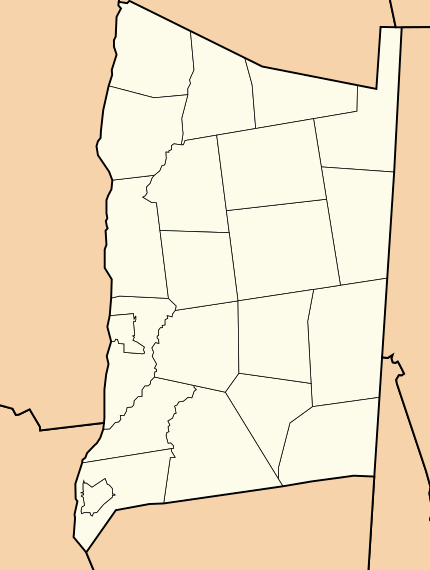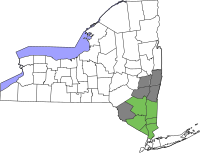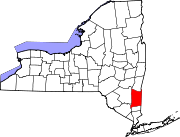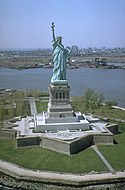Dutchess County, New York
Dutchess County | |
|---|---|
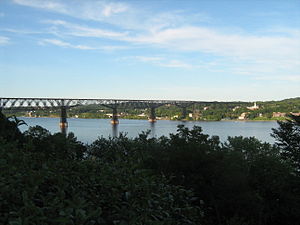 Walkway over the Hudson with the City of Poughkeepsie in the background and the Hudson River in the foreground. | |
 Location within the U.S. state of New York | |
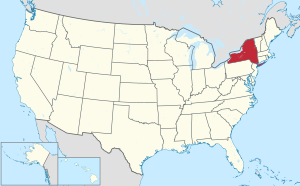 New York's location within the U.S. | |
| Coordinates: 41°46′N 73°45′W / 41.76°N 73.75°W | |
| Country | |
| State | |
| Founded | November 1, 1683[A][B] |
| Named for | Mary of Modena, Duchess of York |
| Seat | Poughkeepsie |
| Largest city | Poughkeepsie |
| Government | |
| • Executive | Sue Serino (R) |
| Area | |
• Total | 825 sq mi (2,140 km2) |
| • Land | 796 sq mi (2,060 km2) |
| • Water | 30 sq mi (80 km2) |
| Population (2020) | |
• Total | 295,911[1] |
• Estimate (2021) | 297,112 |
| Time zone | UTC−5 (Eastern) |
| • Summer (DST) | UTC−4 (EDT) |
| Area code | 845, 518, 838 |
| Congressional districts | 17th, 18th |
| Website | www |
Dutchess County is a county in the U.S. state of New York. As of the 2020 census, the population was 295,911.[4] The county seat is the city of Poughkeepsie.[5] The county was created in 1683, one of New York's first twelve counties,[A] and later organized in 1713.[B][6] The county is part of the Hudson Valley region of the state.
Dutchess County is part of the Kiryas Joel-Poughkeepsie-Newburgh Metropolitan Statistical Area,[7] which belongs to the larger New York–Newark–Bridgeport, NY-NJ-CT-PA Combined Statistical Area.
History
[edit]
Before Anglo-Dutch settlement, what is today Dutchess County was a leading center for the indigenous Wappinger peoples. They had their council-fire at what is now Fishkill Hook,[8] and had settlements throughout the area.
On November 1, 1683, the Province of New York established its first twelve counties, including Dutchess.[A] Its boundaries at that time included the present Putnam County, and a small portion of the present Columbia County (the towns of Clermont and Germantown). The county was named for Mary of Modena, Duchess of York; dutchess is an archaic spelling of the word duchess.[9][10]

The Province of New York and the Connecticut Colony negotiated an agreement on November 28, 1683, establishing their border as 20 miles (32 km) east of the Hudson River, north to Massachusetts. The 61,660 acres (249.5 km2) east of the Byram River making up the Connecticut Panhandle were granted to Connecticut, in recognition of the wishes of the residents. In exchange, Rye was granted to New York, along with a 1.81-mile (2.91 km) wide strip of land running north from Ridgefield to Massachusetts alongside the New York counties of Westchester, Putnam then Dutchess, known as "The Oblong". The eastern half of the stub of land in northeast Dutchess County containing Rudd Pond and Taconic State Park is the northernmost extension of The Oblong.[11]
Until 1713, Dutchess was administered by Ulster County. On October 23, 1713, Queen Anne gave permission for Dutchess County to elect its own officers from among their own population, including a supervisor, tax collector, tax assessor and treasurer. In 2013, Dutchess County celebrated its 300th anniversary of democracy based upon a legislative resolution sponsored by County Legislator Michael Kelsey from Salt Point. In 1812, Putnam County was detached from Dutchess.[12]
The Patents
[edit]This section needs additional citations for verification. (December 2020) |

Fourteen royal land patents were granted between 1685 and 1706 covering the entirety of the original footprint of Dutchess County (which until 1812 included today's Putnam County).
The first ten, granted between 1685 and 1697, covered almost all of Hudson River shoreline in the original county, with three - Rombouts, the Great Nine Partners, and Philipse Patents - extending significantly inland. The eleventh, and smallest, Cuyler, 1697, was the first to contain solely inland territory, just in from the Hudson. The twelfth, and next smallest, Fauconnier, in 1705, completed the Hudson River shoreline. The last two, Beekman, 1705, and the Little Nine Partners, 1706, laid claim to the remaining interior lands.
- 1685 Rombout (Beacon/Fishkill Area)
- 1686 Minnisinck (Sanders & Harmense)
- 1686 Kip
- 1688 Schuyler (Poughkeepsie)
- 1688 Schuyler (Red Hook)
- 1688 Ærtsen-Roosa-Elton
- 1696 Pawling-Staats
- 1697 Rhinebeck
- 1697 (Great) Nine Partners
- 1697 Philipse
- 1697 Cuyler
- 1705 Fauconnier
- 1705 Beekman (Back Lots)
- 1706 (Little) Nine Partners
Early settlement
[edit]From 1683 to 1715, most of the settlers in Dutchess County were Dutch. Many of these moved in from Albany and Ulster counties. They settled along the Fishkill Creek and in the areas that are now Poughkeepsie and Rhinebeck.[13]
From 1715 to 1730, most of the new settlers in Dutchess county were Germans. From 1730 until 1775, New Englanders were the primary new settlers in Dutchess County.[14] Coles Mills was settled by Elisha Cole from Cape Cod in 1747 at the outlet of Barrett Pond into the West Branch of the Croton River. [15]
20th century
[edit]Franklin D. Roosevelt lived in his family home in Hyde Park, overlooking the Hudson River. His family's home is now the Home of Franklin D. Roosevelt National Historic Site, managed by the National Park Service.
Prior to the 1960s, Dutchess County was primarily agricultural. Since then the southwestern part (from Poughkeepsie southward and from the Taconic State Parkway westward) of the county has developed into a largely residential area, suburban in character, with many of its residents commuting to jobs in New York City and Westchester County. The northern and eastern regions of the county remain rural with large farmlands but at the same time developed residences used during the summer and or on weekends by people living in the New York City urban area.[16]
Geography
[edit]According to the U.S. Census Bureau, the county has a total area of 825 square miles (2,140 km2), of which 796 square miles (2,060 km2) is land and 30 square miles (78 km2) (3.6%) is water.[17]
Dutchess County is located in southeastern New York State, between the Hudson River on its west and the New York–Connecticut border on its east, about halfway between the cities of Albany and New York City. It contains two cities: Beacon and Poughkeepsie. Depending on precise location within the county, road travel distance to New York City ranges between 58 and 110 miles (93 and 177 km).
The terrain of the county is mostly hilly, especially in the Hudson Highlands in the southwestern corner and the Taconic Mountains to the northeast. Some areas nearer the river are flatter.

The highest point in the county is the summit of Brace Mountain, in the Taconics, at 2,311 feet (704 m) above sea level. The lowest point is sea level, along the Hudson River. The highest point of neighboring Fairfield County, Connecticut, is a 1,290-foot (390 m) point along the state line in Pawling.
Wappinger Creek, at 41.7 mi (67.1 km) from its source at Thompson Pond in Pine Plains to where it drains into the Hudson at New Hamburg, is the longest stream in the county. Its 211-square-mile (550 km2) watershed is likewise the largest in the county. To its south is the 193-square-mile (500 km2) watershed of Dutchess County's second-longest stream, 33.5 mi (53.9 km) Fishkill Creek, part of which spills over into Putnam County. Within that watershed are the county's third-longest stream, Sprout Creek, and its largest, deepest and highest lakes: Whaley (252 acres (102 ha)), in the town of Pawling; Sylvan (143 ft (44 m)) in the town of Beekman and Beacon Reservoir, in the town of Fishkill, at 1,285 ft (392 m) respectively.
Other, smaller tributaries of the Hudson such as the Saw Kill drain the northwestern portion of the county. The southeastern fringe of Dutchess is part of the upper Croton River watershed and thus part of the New York City water supply system. On the east, in the Oblong, streams drain into the Housatonic River in adjacent Connecticut.
A border nearly one-half mile (800 m) long exists with Berkshire County, Massachusetts, in the extreme northern end of the county.
Adjacent counties
[edit]- Columbia County – north
- Berkshire County, Massachusetts – northeast
- Litchfield County, Connecticut – east
- Fairfield County, Connecticut – southeast
- Putnam County – south
- Orange County – southwest
- Ulster County – west
National protected areas
[edit]- Appalachian Trail, crosses county from Putnam County line in East Fishkill to Connecticut state line near Wingdale; corridor is partly on federally protected land.
- Eleanor Roosevelt National Historic Site
- Great Thicket National Wildlife Refuge, one of six discontiguous parcels in Dover
- Home of Franklin D. Roosevelt National Historic Site
- Vanderbilt Mansion National Historic Site
State, county, and town parks
[edit]- Bowdoin County Park
- Fahnestock State Park (shared with Putnam County)
- Hudson Highlands State Park (shared with Putnam and Westchester counties)
- Stratt Town Park
- Wilcox County Park
- Tymor Forest
- Taconic State Park
- Beekman Rec
- East Fishkill Rec
- James Baird State Park
- Poughkeepsie Bridge (Walkway over the Hudson)
- Dover Stone Church
- Carnwath Farms Historic Site & Park
- Roosevelt Farm Lane
- Stony Kill Farm
- Mills–Norrie State Park
- Staatsburgh State Historic Site
- Tivoli Bays Unique Area
Privately protected open space
[edit]- Mary Flagler Cary Arboretum
- Ferncliff Forest
- Innisfree Garden
- Pawling Nature Preserve
- Poets' Walk Park
- Thompson Pond and neighboring Stissing Mountain
Demographics
[edit]| Census | Pop. | Note | %± |
|---|---|---|---|
| 1790 | 45,276 | — | |
| 1800 | 47,775 | 5.5% | |
| 1810 | 51,363 | 7.5% | |
| 1820 | 46,615 | −9.2% | |
| 1830 | 50,926 | 9.2% | |
| 1840 | 52,398 | 2.9% | |
| 1850 | 58,992 | 12.6% | |
| 1860 | 64,941 | 10.1% | |
| 1870 | 74,041 | 14.0% | |
| 1880 | 79,184 | 6.9% | |
| 1890 | 77,879 | −1.6% | |
| 1900 | 81,670 | 4.9% | |
| 1910 | 87,661 | 7.3% | |
| 1920 | 91,747 | 4.7% | |
| 1930 | 105,462 | 14.9% | |
| 1940 | 120,542 | 14.3% | |
| 1950 | 136,781 | 13.5% | |
| 1960 | 176,008 | 28.7% | |
| 1970 | 222,295 | 26.3% | |
| 1980 | 245,055 | 10.2% | |
| 1990 | 259,462 | 5.9% | |
| 2000 | 280,150 | 8.0% | |
| 2010 | 297,488 | 6.2% | |
| 2020 | 295,911 | −0.5% | |
| 2021 (est.) | 297,112 | 0.4% | |
| U.S. Decennial Census[18] 1790–1960[19] 1900–1990[20] 1990–2000[21] 2010–2020[4] | |||
2020 census
[edit]| Race | Num. | Perc. |
|---|---|---|
| White (NH) | 198,495 | 67.1% |
| Black or African American (NH) | 30,126 | 10.2% |
| Native American (NH) | 387 | 0.13% |
| Asian (NH) | 10,635 | 3.6% |
| Pacific Islander (NH) | 67 | 0.02% |
| Other/Mixed (NH) | 13,977 | 4.72% |
| Hispanic or Latino | 42,224 | 14.7% |
2000 census
[edit]As of the census[23] of 2000, there were 280,150 people, 99,536 households, and 69,177 families residing in the county. The population density was 350 inhabitants per square mile (140/km2). There were 106,103 housing units at an average density of 132 units per square mile (51/km2). 22.0% of the population was of Italian, 16.9% Irish, 11.3% German and 6.7% English ancestry according to Census 2000. 88.3% spoke English and 4.8% spoke Spanish.
Based on the Census Ancestry tallies, including people who listed more than one ancestry, Italians were the largest group in Dutchess County with 60,645. Irish came in a very close second at 59,991. In third place were the 44,915 Germans who barely exceeded the 44,078 people not in the 105 specifically delineated ancestry groups.[24]
There were 99,536 households, out of which 34.5% had children under the age of 18 living with them, 55.5% were married couples living together, 10.3% had a female householder with no husband present, and 30.5% were non-families. 24.6% of all households were made up of individuals, and 9.0% had someone living alone who was 65 years of age or older. The average household size was 2.63 and the average family size was 3.16.
As of Q4 2021, the median home value in Dutchess County was $365,199, an increase of 13.8% from the prior year.[25]
In the county, the age distribution of the population shows 25.1% under the age of 18, 9.4% from 18 to 24, 30.2% from 25 to 44, 23.2% from 45 to 64, and 12.0% who were 65 years of age or older. The median age was 37 years. For every 100 females, there were 100.1 males. For every 100 females age 18 and over, there were 98.2 males.
The median income for a household in the county was $53,086, and the median income for a family was $63,254. Males had a median income of $45,576 versus $30,706 for females. The per capita income for the county was $23,940. About 5.0% of families and 7.5% of the population were below the poverty line, including 8.5% of those under age 18 and 6.5% of those age 65 or over.
The decrease in population between 1810 and 1820 was due to the separation of Putnam County from Dutchess in 1812.
Racial demographics
[edit]As of 2017, the residents of Dutchess County were reported as the following: American Indian and Alaska Native (0.04%), Asian (4%), Black or African American (8.5%), Hispanic or Latino (12.5%), Native Hawaiian and Other Pacific Islander (0.016%), Some Other Race (0.35%), Two or More Races (3%), White (71%).[26]

Government
[edit]
Dutchess County has a Charter Government with a County Executive and directly elected legislature of 25 members, each elected from a single member district.[27] The Charter form of Government went in to effect in 1968 given the favorable outcome of a 1967 special election dedicated to the question.[28] From 1713 until 1967, the County Government had been managed by a Board of Supervisors, made up of the locally elected leaders.[29]
| Name | Party | Term |
|---|---|---|
| David C. Schoentag | Republican | January 1, 1968 – December 31, 1971 |
| Edward C. Scheuler | Republican | January 1, 1976 – April 29, 1978 |
| James D. Benson | Republican | April 29, 1978 – December 31, 1978 |
| Lucille P. Pattison | Democratic | January 1, 1979 – December 31, 1991 |
| William R. Steinhaus | Republican | January 1, 1992 – December 31, 2011 |
| Marcus J. Molinaro | Republican | January 1, 2012 – January 2, 2023 |
| William F.X. O'Neil | Republican | January 3, 2023 – December 31, 2023 |
| Sue Serino | Republican | January 1, 2024 – Present |
| District | Legislator | Title | Party | Residence |
|---|---|---|---|---|
| 1 | Bob Gorman | Republican | Poughkeepsie | |
| 2 | Ryan Travelpiece | Republican | Pleasant Valley | |
| 3 | Michael Polasek | Assistant Majority Leader | Republican | Poughkeepsie |
| 4 | Brendan Lawler | Democratic | Hyde Park | |
| 5 | Tony D’Aquanni | Republican | Poughkeepsie | |
| 6 | Lisa R. Kaul | Democratic | Poughkeepsie | |
| 7 | Will Truitt | Chairman | Republican | Hyde Park |
| 8 | Craig P. Brendli | Democratic | Poughkeepsie | |
| 9 | Barrington R. Atkins | Assistant Minority Leader | Democratic | Poughkeepsie |
| 10 | Randy Johnson | Democratic | Poughkeepsie | |
| 11 | Brennan Kearney | Democratic | Rhinebeck | |
| 12 | John D. Metzger | Republican | Hopewell Junction | |
| 13 | Lisa Paoloni | Republican | Wappingers Falls | |
| 14 | Lynne Versaci | Republican | Wappingers Falls | |
| 15 | Robert S. Faust | Republican | Wappingers Falls | |
| 16 | Yvette Valdés Smith | Minority Leader | Democratic | Beacon |
| 17 | Doug McHoul | Republican | Fishkill | |
| 18 | Nick Page | Democratic | Beacon | |
| 19 | Chris Drago | Democratic | Stanfordville | |
| 20 | Kristofer Munn | Democratic | Red Hook | |
| 21 | Stephen M. Caswell | Republican | Stormville | |
| 22 | Faye Garito | Republican | Poughquag | |
| 23 | Chris Rolison | Republican | Hopewell Junction | |
| 24 | Andrew J. House | Republican | Dover Plains | |
| 25 | Deirdre A. Houston | Majority Leader | Republican | Millbrook |
Elections
[edit]| Year | Republican | Democratic | Third party(ies) | |||
|---|---|---|---|---|---|---|
| No. | % | No. | % | No. | % | |
| 2024 | 69,307 | 47.27% | 75,795 | 51.70% | 1,512 | 1.03% |
| 2020 | 66,872 | 44.25% | 81,443 | 53.89% | 2,807 | 1.86% |
| 2016 | 61,821 | 47.19% | 62,285 | 47.54% | 6,912 | 5.28% |
| 2012 | 56,025 | 45.29% | 65,312 | 52.80% | 2,368 | 1.91% |
| 2008 | 59,628 | 45.07% | 71,060 | 53.71% | 1,614 | 1.22% |
| 2004 | 63,372 | 51.16% | 58,232 | 47.01% | 2,277 | 1.84% |
| 2000 | 52,669 | 47.12% | 52,390 | 46.87% | 6,712 | 6.01% |
| 1996 | 41,929 | 40.39% | 47,339 | 45.60% | 14,553 | 14.02% |
| 1992 | 46,709 | 40.50% | 41,655 | 36.12% | 26,964 | 23.38% |
| 1988 | 62,165 | 60.97% | 38,968 | 38.22% | 826 | 0.81% |
| 1984 | 70,324 | 67.89% | 32,867 | 31.73% | 389 | 0.38% |
| 1980 | 53,616 | 57.65% | 28,616 | 30.77% | 10,775 | 11.59% |
| 1976 | 51,312 | 56.94% | 37,531 | 41.65% | 1,268 | 1.41% |
| 1972 | 64,864 | 69.82% | 27,872 | 30.00% | 167 | 0.18% |
| 1968 | 45,032 | 54.87% | 31,025 | 37.80% | 6,010 | 7.32% |
| 1964 | 29,503 | 37.01% | 50,179 | 62.94% | 43 | 0.05% |
| 1960 | 46,109 | 60.67% | 29,842 | 39.26% | 53 | 0.07% |
| 1956 | 53,840 | 78.35% | 14,876 | 21.65% | 0 | 0.00% |
| 1952 | 46,381 | 71.17% | 18,644 | 28.61% | 142 | 0.22% |
| 1948 | 34,067 | 64.23% | 17,439 | 32.88% | 1,533 | 2.89% |
| 1944 | 32,890 | 58.92% | 22,778 | 40.80% | 158 | 0.28% |
| 1940 | 32,329 | 55.69% | 25,598 | 44.10% | 122 | 0.21% |
| 1936 | 28,868 | 53.12% | 24,467 | 45.02% | 1,010 | 1.86% |
| 1932 | 25,757 | 54.95% | 20,374 | 43.47% | 740 | 1.58% |
| 1928 | 28,687 | 61.30% | 16,748 | 35.79% | 1,366 | 2.92% |
| 1924 | 22,173 | 64.64% | 8,864 | 25.84% | 3,266 | 9.52% |
| 1920 | 21,152 | 65.60% | 9,938 | 30.82% | 1,156 | 3.58% |
| 1916 | 11,082 | 54.60% | 8,906 | 43.88% | 310 | 1.53% |
| 1912 | 8,916 | 43.65% | 8,871 | 43.43% | 2,638 | 12.92% |
| 1908 | 11,132 | 53.58% | 8,961 | 43.13% | 682 | 3.28% |
| 1904 | 11,709 | 57.06% | 8,275 | 40.32% | 537 | 2.62% |
| 1900 | 11,936 | 59.39% | 7,691 | 38.27% | 471 | 2.34% |
| 1896 | 12,127 | 62.44% | 6,634 | 34.16% | 661 | 3.40% |
| 1892 | 9,376 | 48.09% | 8,978 | 46.05% | 1,141 | 5.85% |
| 1888 | 10,265 | 50.95% | 9,249 | 45.91% | 634 | 3.15% |
| 1884 | 9,701 | 51.13% | 8,677 | 45.73% | 596 | 3.14% |
The composition of the County Legislature is 15 Republicans and 10 Democrats for the 2024–2025 term. County elections occur in odd-numbered years.[32]
Historically, Dutchess County, like most of the lower Hudson, was classic "Yankee Republican" territory. Between 1884 and 2004, the Republican presidential candidate carried Dutchess County in 28 out of 30 elections (1964 and 1996 being exceptions). Even Hyde Park resident Franklin D. Roosevelt failed to carry the county during his four campaigns.
The Republican edge narrowed significantly in the 1990s, with George H. W. Bush going from 61 percent of the county's vote in 1988 to only 40.5 percent in 1992, although that likely was affected by the presence of Ross Perot on the ballot as a third-party candidate. In 2008, Barack Obama became only the third Democrat to carry the county since 1884, and the first to win a majority since Lyndon Johnson in 1964. It has gone for the Democratic candidate in four consecutive elections (2008, 2012, 2016, and 2020).
Dutchess County is split between two congressional districts. The most southern portion is in the 17th district, represented by Republican Mike Lawler. The rest of the county is in the 18th district, represented by Democrat Pat Ryan. These are considered "swing" districts nationally, with Cook Partisan Voting Index ratings of D+3 and D+1, respectively, as of 2022.
Law enforcement
[edit]The Cities of Beacon and Poughkeepsie; Towns of Fishkill, Hyde Park, Pine Plains, Poughkeepsie, Rhinebeck, Red Hook, and East Fishkill; and Villages of Millerton, Wappingers Falls, Millbrook, have their own Police departments. The remainder of the county is patrolled by the Dutchess County Sheriff's Office and New York State Police. The New York State Police Troop K headquarters is located in Millbrook.
Communities
[edit]N.B.: Cities, Towns and Villages are official political designations.
Cities
[edit]- Beacon
- Poughkeepsie (county seat)
Towns
[edit]Villages
[edit]Census-designated places
[edit]- Amenia
- Arlington
- Bard College
- Barrytown
- Brinckerhoff
- Chelsea Cove
- Crown Heights
- Dover Plains
- Fairview
- Freedom Plains
- Haviland
- Hillside Lake
- Hopewell Junction
- Hyde Park
- MacDonnell Heights
- Marist College
- Merritt Park
- Myers Corner
- New Hackensack
- New Hamburg
- Pine Plains
- Pleasant Valley
- Red Oaks Mill
- Rhinecliff
- Salt Point
- Shorehaven
- Spackenkill
- Staatsburg
- Titusville
- Upper Red Hook
- Vassar College
- Wassaic
- Wingdale
Hamlets
[edit]- Annandale-on-Hudson
- Arthursburg
- Attlebury
- Bangall
- Barnegat
- Castle Point
- De Witt Mills
- Fishkill Plains
- Glenham
- Gretna
- Holmes
- Hopewell Junction
- Hortontown
- Hughsonville
- Johnsontown
- Knapps Corner
- Lithgow
- Lomala
- Mabbettsville
- McIntyre
- Millbrook
- Norrie Heights
- Pecksville
- Pleasant Plains
- Poughquag
- Quaker Hill
- Rudco
- Shenandoah
- Shekomeko
- Staatsburg
- Stanfordville
- Stissing
- Stormville
- Swartwoutville[33]
- Van Keurens
- Verbank
- Wiccopee
- Willow Brook
Education
[edit]Public school districts
[edit]- Arlington Central School District
- Beacon City School District
- Dover Union Free School District
- Hyde Park Central School District
- Millbrook Central School District
- Pawling Central School District
- Pine Plains Central School District
- Poughkeepsie City School District
- Red Hook Central School District
- Rhinebeck Central School District
- Spackenkill Union Free School District
- Wappingers Central School District
- Webutuck Central School District
- Dutchess County BOCES
Private schools
[edit]- Dutchess Day School
- Hawk Meadow Montessori School
- Holy Trinity School
- Millbrook School
- Oakwood Friends School
- Our Lady of Lourdes High School
- Poughkeepsie Day School
- Randolph School
- St. Denis-St. Columba School
- St. Martin de Porres School
- St. Mary School - Fishkill
- Trinity-Pawling School
- Tabernacle Christian Academy
- Upton Lake Christian School
Higher education
[edit]- Bard College (Annandale-on-Hudson)
- Culinary Institute of America main campus (Hyde Park)
- Dutchess Community College (Poughkeepsie)
- Marist College (Poughkeepsie)
- Vassar College (Poughkeepsie)
Transportation
[edit]Roads
[edit]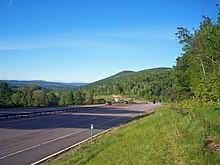
- Interstate 84 traverses the county in an east–west route cutting through the southwestern quadrant of the county before entering Putnam County. It is the only interstate highway in the county.
- US 9, the Taconic State Parkway (the only other limited-access road in the county besides I-84, although it still has some at-grade intersections), and NY 22 are the main north–south roads in the county. For much of its length the Taconic is paralleled by NY 82. NY 9G leaves US 9 in Poughkeepsie and parallels it north to the Columbia County line.
- US 44, NY 52, NY 55, and NY 199 are the other primary east–west roads in the county. NY 52 enters the county concurrent with I-84, leaves it at Fishkill but then follows it into Putnam County.
Crossings
[edit]
Three spans cross the Hudson River, linking Dutchess with Orange, Ulster, and Greene Counties:
- The Newburgh-Beacon Bridge carries Interstate 84 and NY 52 between Fishkill/Beacon and Newburgh (Orange County). The westbound span opened in 1963 and the eastbound span opened in 1980.
- The Mid-Hudson Bridge carries US 44 and NY 55 between Poughkeepsie and Highland (Town of Lloyd, Ulster County)
- The Kingston-Rhinecliff Bridge carries NY 199 between Rhinebeck and Kingston (Ulster County)
Railroads
[edit]
The Metro-North railroad provides a critical link to New York City for Dutchess County's commuting population. The Hudson Line and Amtrak run concurrently along the Hudson River, on the western edge of the county. The Hudson Line has stops at Breakneck Ridge, Beacon, and New Hamburg (a hamlet of the town of Poughkeepsie) before the Hudson Line terminates at Poughkeepsie. The tracks continue north of that point as Amtrak, with Poughkeepsie and Rhinecliff (a small hamlet in the Town of Rhinebeck) being stops along Amtrak's Empire Service.
The Harlem Line, on the eastern side of the county, has station stops in Pawling, along the Appalachian Trail, Wingdale, Dover Plains, and two stops in Wassaic (one along the Tenmile River and the other the namesake terminus of that line).
Buses and ferries
[edit]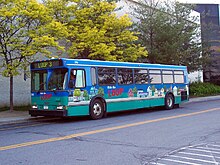
Public transportation in Dutchess County is handled by Dutchess County Public Transit, commonly called "the LOOP." Outside of the urbanized area of the county, most service is limited. Privately run lines connect Poughkeepsie to New Paltz and Beacon to Newburgh. Leprechaun Lines and Short Line Bus also operate some service through Poughkeepsie, Rhinebeck, and the southern part of the county.
NY Waterway operates the Newburgh–Beacon Ferry, which is located at the Beacon train station.
Air
[edit]General aviation facilities are located at Hudson Valley Regional Airport (formerly Dutchess County Airport), located in Wappinger and Sky Park Airport in Red Hook, New York.[34] General commercial passenger service is provided by New York Stewart International Airport, which is located across the Hudson River in Newburgh.

Culture
[edit]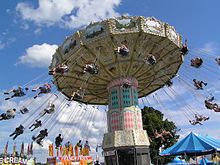
Dutchess County holds an annual county fair. The County Chamber of Commerce holds an annual hot air balloon launch typically in the first week of July. The main launch sites are along the Hudson River. As many as 20 balloons participate in the event.
The Dutchess County Historical Society was formed in 1914 and is active in the preservation of a large collection at the 18th century Clinton House. The Society has published a yearbook since 1914 and presents up to four awards of merit in the field of Dutchess County history each year.
Media
[edit]Dutchess County has no locally based television stations. Its only news radio format station is WKIP (AM) of Poughkeepsie. WRHV is an NPR affiliated broadcasting out of Poughkeepsie. The country music format station, WRWB-FM, broadcasting across the Hudson River, can be reached in much of the county.
Poughkeepsie Journal is published in that city. Vassar Miscellany News, associated with Vassar College, is published weekly. Also published in the county is the Beacon Free Press/Southern Dutchess News.
Health
[edit]The county is home to four hospitals. Northern Dutchess Hospital in Rhinebeck and Vassar Brothers Medical Center in Poughkeepsie are both owned by Nuvance Health. In addition, MidHudson Regional Hospital (formerly St. Francis) is located in Poughkeepsie and The Castle Point Veterans Health Administration is in Wappinger.
On March 11, 2020, the county's first case of COVID-19 was confirmed. As of June 2021, there had been 29,483 cases and 445 deaths.[35]
Sports
[edit]The Hudson Valley Renegades are a minor league baseball team affiliated with the New York Yankees. The team is a member of the High-A East, play at Dutchess Stadium in Fishkill and have been located in Dutchess County since 1994.
Previous professional sports teams include the Hudson Valley Bears (2008-2009) which played hockey, and the Hudson Valley Hawks which played in the former National Professional Basketball League.
See also
[edit]- List of counties in New York
- National Register of Historic Places listings in Dutchess County, New York
- Hudson Valley
Notes
[edit]- ^ a b c "When, in 1682, Colonel Thomas Dongan was appointed Governor of the Province of New York, he was instructed to form a council of not more than ten of the 'most eminent Inhabitants' who were to assist him in the making of 'fit' laws. One of the first acts authorized by this council was the erection of twelve 'countyes,' on which Dutchess was one (November 1, 1683)."[2]
- ^ a b "There were too few inhabitants of Dutchess at its erection for it to be represented separately in the General Assembly, so that it was provisionally attached to Ulster until 1713."[3]
References
[edit]- ^ "US Census 2020 Population Dataset Tables for New York". United States Census Bureau. Retrieved January 2, 2022.
- ^ Sullivan, James; Williams, Melvin E.; Conklin, Edwin P.; Fitzpatrick, Benedict, eds. (1927). "Chapter XII. Dutchess County.". History of New York State, 1523–1927 (PDF). Vol. 2. New York City, Chicago: Lewis Historical Publishing Co. p. 499. hdl:2027/mdp.39015019994048. Wikidata Q114149636.
- ^ Sullivan, James; Williams, Melvin E.; Conklin, Edwin P.; Fitzpatrick, Benedict, eds. (1927). "Chapter XII. Dutchess County.". History of New York State, 1523–1927 (PDF). Vol. 2. New York City, Chicago: Lewis Historical Publishing Co. p. 500. hdl:2027/mdp.39015019994048. Wikidata Q114149636.
- ^ a b "U.S. Census Bureau QuickFacts: Dutchess County, New York". United States Census Bureau. Archived from the original on January 21, 2022. Retrieved January 3, 2022.
- ^ "Find a County". National Association of Counties. Archived from the original on July 12, 2012. Retrieved June 7, 2011.
- ^ Hasbrouck, Frank, ed. (1909). The History of Dutchess County New York. Poughkeepsie, New York: S. A. Matthieu. Retrieved January 9, 2015.
- ^ United States Office of Management and Budget (September 14, 2018). "OMB Bulletin No. 18-04" (PDF). Retrieved July 11, 2019.
- ^ MacCraken, Henry Noble, Old Dutchess Forever! The Story of an American County (New York: Hastings House, 1956) p. 3
- ^ Gannett, Henry (1905). The Origin of Certain Place Names in the United States. Govt. Print. Off. pp. 111.
- ^ "A Brief History of Dutchess County".
- ^ "New York State Parks Recreation & Historic Preservation" (PDF).
- ^ "New York: Individual County Chronologies". New York Atlas of Historical County Boundaries. The Newberry Library. 2008. Archived from the original on April 10, 2015. Retrieved January 9, 2015.
- ^ Pucher, J. Wilson and Helen Wilkinson Reynolds, Old Gravestones of Dutchess County, New York (Poughkeepsie: Dutchess County Historical Society, 1924) p. xi
- ^ Pulcher and Reynolds. Old Gravestones. p. xi
- ^ https://hyzercreek.com/cole.htm, retrieved 5/24/23.
- ^ Hobson, Archie, ed., The Cambridge Gazetteer of the United States and Canada (New York: Cambridge University Press, 1995) pp. 183–184
- ^ "2010 Census Gazetteer Files". United States Census Bureau. August 22, 2012. Archived from the original on May 19, 2014. Retrieved January 4, 2015.
- ^ "U.S. Decennial Census". United States Census Bureau. Retrieved January 4, 2015.
- ^ "Historical Census Browser". University of Virginia Library. Archived from the original on August 11, 2012. Retrieved January 4, 2015.
- ^ "Population of Counties by Decennial Census: 1900 to 1990". United States Census Bureau. Retrieved January 4, 2015.
- ^ "Census 2000 PHC-T-4. Ranking Tables for Counties: 1990 and 2000" (PDF). United States Census Bureau. Retrieved January 4, 2015.
- ^ "P2 HISPANIC OR LATINO, AND NOT HISPANIC OR LATINO BY RACE – 2020: DEC Redistricting Data (PL 94-171) – Dutchess County, New York".
- ^ "U.S. Census website". United States Census Bureau. Retrieved January 31, 2008.
- ^ U.S. Census website chart on Ancestries for Dutchess County, New York
- ^ "County Median Home Price". National Association of Realtors. January 4, 2019. Archived from the original on April 20, 2022. Retrieved April 14, 2022.
{{cite web}}: CS1 maint: bot: original URL status unknown (link) - ^ a b "Dutchess County, NY | Data USA". datausa.io. Retrieved November 15, 2019.
- ^ "Residents Vote For Major Change". Poughkeepsie Journal. Poughkeepsie, NY. April 18, 1967.
- ^ "A Brief History of Dutchess County". Dutchess County Government.
- ^ William P. Tatum III, Ph.D., County Historian (June 2017). "Dutchess County Government History Exhibit". Dutchess County Government.
{{cite web}}: CS1 maint: multiple names: authors list (link) - ^ "Legislators". Dutchess County Government. Retrieved June 21, 2021.
- ^ Leip, David. "Dave Leip's Atlas of U.S. Presidential Elections". uselectionatlas.org. Retrieved October 22, 2018.
- ^ "Dutchess County, NY County Legislature". Dutchess County, NY. eCode 360. Retrieved June 21, 2021.
- ^ "Swartwoutville". Archived from the original on February 15, 2013. Retrieved December 12, 2012.
- ^ FAA Airport Form 5010 for 46N PDF. Federal Aviation Administration. Effective April 10, 2008.
- ^ "ArcGIS Dashboards". dcny.maps.arcgis.com. Retrieved December 20, 2020.
Further reading
[edit]- MacCracken, Henry Noble. Old Dutchess Forever!, New York: Hastings House, ©1956. LC 56-12863
- Smith, James H. History of Dutchess County, New York, Syracuse, New York: 1882. Reprinted: Interlaken, New York: Heart of the Lakes Publishing. ISBN 0-932334-35-0
- Sullivan, James; Williams, Melvin E.; Conklin, Edwin P.; Fitzpatrick, Benedict, eds. (1927). "Chapter XII. Dutchess County.". History of New York State, 1523–1927 (PDF). Vol. 2. New York City, Chicago: Lewis Historical Publishing Co. p. 499-505. hdl:2027/mdp.39015019994048. Wikidata Q114149636.



